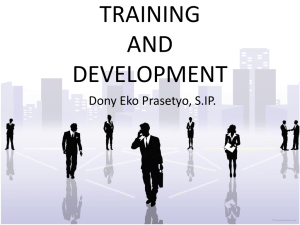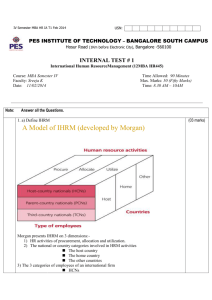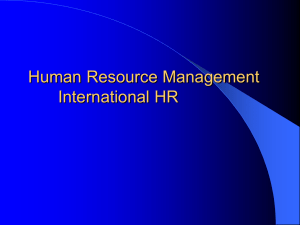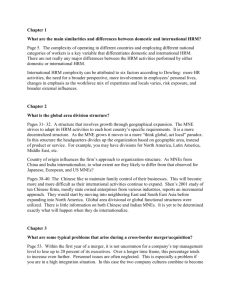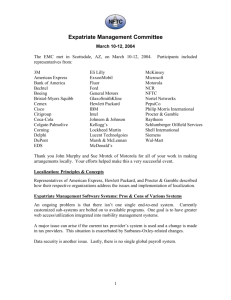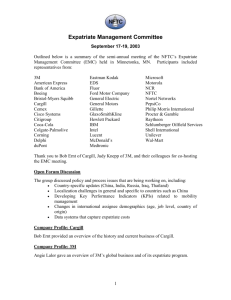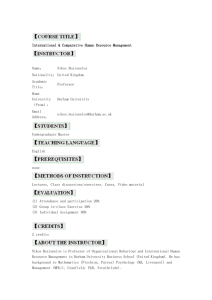content summarry - Assumption University
advertisement
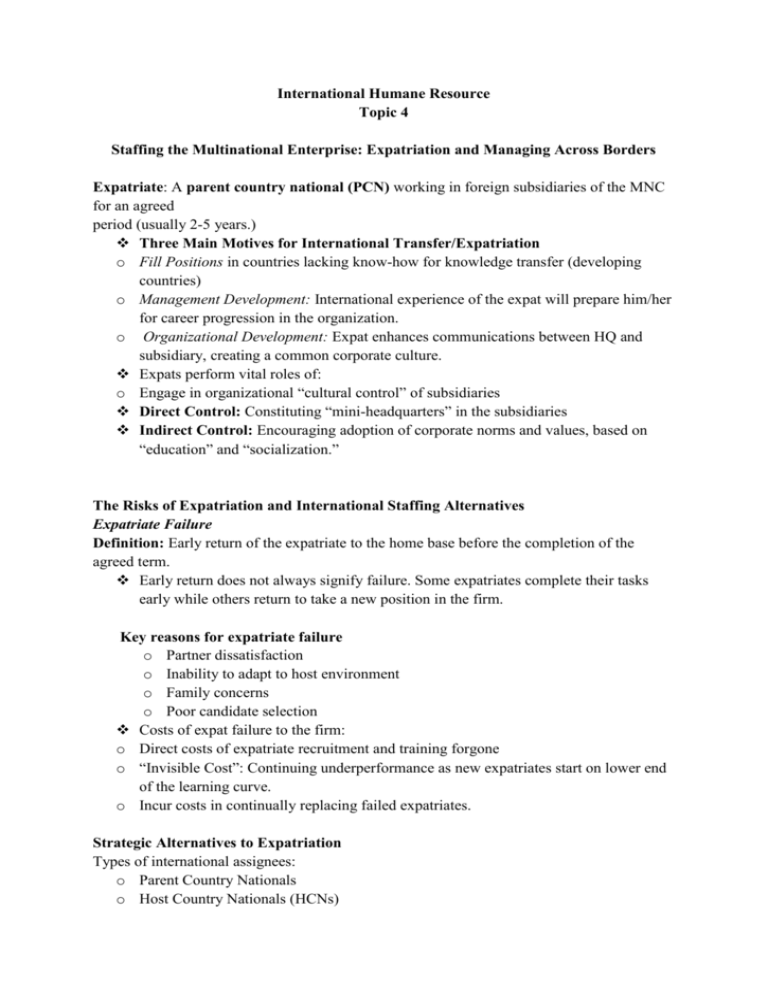
International Humane Resource Topic 4 Staffing the Multinational Enterprise: Expatriation and Managing Across Borders Expatriate: A parent country national (PCN) working in foreign subsidiaries of the MNC for an agreed period (usually 2-5 years.) Three Main Motives for International Transfer/Expatriation o Fill Positions in countries lacking know-how for knowledge transfer (developing countries) o Management Development: International experience of the expat will prepare him/her for career progression in the organization. o Organizational Development: Expat enhances communications between HQ and subsidiary, creating a common corporate culture. Expats perform vital roles of: o Engage in organizational “cultural control” of subsidiaries Direct Control: Constituting “mini-headquarters” in the subsidiaries Indirect Control: Encouraging adoption of corporate norms and values, based on “education” and “socialization.” The Risks of Expatriation and International Staffing Alternatives Expatriate Failure Definition: Early return of the expatriate to the home base before the completion of the agreed term. Early return does not always signify failure. Some expatriates complete their tasks early while others return to take a new position in the firm. Key reasons for expatriate failure o Partner dissatisfaction o Inability to adapt to host environment o Family concerns o Poor candidate selection Costs of expat failure to the firm: o Direct costs of expatriate recruitment and training forgone o “Invisible Cost”: Continuing underperformance as new expatriates start on lower end of the learning curve. o Incur costs in continually replacing failed expatriates. Strategic Alternatives to Expatriation Types of international assignees: o Parent Country Nationals o Host Country Nationals (HCNs) o o o o o o o o o o o Third Country Nationals (TCNs) International Commuters Employees on short-term postings Permanent transferees International transferees: moving from one subsidiary to another Immigrants Returnees Contract expatriates Virtual international employees Companies seek alternatives to expatriation to lower costs Many used short-term assignments (home country rates are paid with few extras), localized expatriates (host country rates are paid), and business travel (relocation unnecessary for the assignee and family.) Devolving to the Subsidiary HCNs – polycentricism Host Country Managers (HCMs) can contribute invaluable resources of local knowledge to firms o Pertaining to socioeconomic, political, and legal circumstances o Business practices in the host environment o Provide greater continuity and reliability in subsidiary staffing Third Country Nationals (TCNs): Internationally mobile staff whose origins are neither the home country of their employer nor the country of assignment. o TCNs can provide an optimal position of technical proficiency and cross-cultural sensitivity Inpatriation : subsidiary manager in the parent HQ for particular period of time Gain from this exp. By actual exposure norms, value and state-of-the-art knowledge in parent Establish informal communication network b/w subsidiary and parent o Boomerangs: Japanese HR term describing Japanese workers who migrated to the West, returning home with rich knowledge to apply with local awareness for business effectiveness. Working across Cultures Problems related with diversity include: o Mistrust: Difficulties in understanding culturally distant modes of interaction and business o customs (e.g. Individualistic US Managers vs. Collectivist Japanese Managers) o Stereotyping: Culturally-rooted preconceptions and prejudices concerning international o Colleagues. o Inaccurate communication: Translation problems, definition issues, misinterpretations of body o language o Different perceptions and uses of time: Punctuality, commitment during meetings, task o scheduling (e.g. Thai employees vs. German employees) Multicultural or Diverse team: offer adv. Over homogenous managerial grouping o Create great number of unique suggestion for innovative or creative ideas o Need to avoid groupthink Expatriate Adjustment Expatriates experience risk of facing culture shock Adjustment: General satisfaction of one’s life to the new environment. Degree of fit between the expatriate manager and the environment. Inadequate adjustment leads to ineffective job performance Three Types of Adjustment: 1. Psychological Adjustment: Changes of psychological and emotional states marked by feelings of well-being and satisfaction. 2. Interaction Adjustment: Changes of the employee’s behavior and attitudes – can “fit in” and “negotiate” interactive aspects of the new culture. 3. Work Adjustment: Changes in reaction to the new job. Framework of International Adjustment o Anticipatory Adjustment: Factors facilitating effective expatriation before departure. Concerned with determination of accurate expectations on the part of expatriates, prevents culture shock. International experience of the expatriate Organization’s selection criteria for identifying expatriates Technical and cross-cultural training of expatriates before sending them overseas. o In-country Adjustment: Factors relating to work, interaction with HCNs, and coping with living conditions that determines expatriate success following arrival at the host country. Individual Factors: Expatriate’s behavioral characteristics (Relation Skills) Self-efficacy: Ability to learn from mistakes and perceive unavoidable failures as learning experiences – helpful when expat faces cultural shock. Perception Skills Job-Related Factors Role Clarity Role Discretion Role Novelty: Newness of tasks Role Conflict Non-work factors Cultural Novelty Family, spouse adjustment Period of Adjustment Phase 1: Tourist o Mixed emotions o Honeymoon period upon arrival: short-term experience of enchantment o As realities become apparent, expatriate may experience a downswing mood – o leading to the crisis phase. Phase 2: Crisis o Determines success or failure of the assignment o Self-efficacy essential in this stage Phase 3: Pulling Up o Recovery and emotional stabilization (if persisted through Crisis) Phase 4: Adjustment o Healthy recovery and integration into new environment o Returning home may require expatriate to further adjust Criticisms of the model: o Stereotyping, overgeneralizing, and normalizing adjustment nature Topic 5 Working across Boarders: The Expatriation Cycle Expatriate Selection Criteria in filling expatriate positions: Job suitability – relating to the technical expertise of the potential expatriate and his or her ability to perform job requirements Cultural adaptability – there is a growing recognition that employees must be able to adjust to new and alien job environments while delivering their technical and managerial expertise Desire for foreign assignment (candidate and family) – the willingness of the potential expatriate to make the necessary effort to adjust needs to be assessed during the candidate review Profiles of successful international assignees – companies and consultancies have established profiles of successful international assignees that are used for screening purposes Such profiles typically include the following factors – experience, education, personal interests and activities, signs of flexibility, family situation and desire for the assignment Equal opportunity issues in expatriate selection The under-representation of females in expatriate positions represents a fundamental equal opportunities challenge for the global enterprises in which undertaking an international assignment is a prerequisite for progression to senior management. The reasons for poor representation of women in international management groupings are closely related to broader patterns of discrimination at work which are manifested in the failure of women to reach the highest management positions or the confinement of women to lower-status occupations. Organizational preconceptions First myth is that women do not wish to undertake international assignments. Culturally tough - Women may be less prepared than men to accept assignments to regions. Second organizational myth is that host-national men would be reluctant to deal with female expatriates Organizational policies Organizations should: Become more strategic in their planning for international assignments in order to prevent ad hoc and informal placements that may replicate an existing expatriate profile and prevent the adoption of alternative approaches Adopt a sophisticated approach to the determination of criteria for effective international managers. Competences should be developed and debated in as wide and diverse a forum as possible Monitor their selection processes for international management assignments to ensure access is not unfairly restricted to specific sections of employees Run selection skills training for all employees involved in selection for international assignments Avoid assumptions as to the likely motivation of women to accept oversea assignments and the likely success rates of women expatriate Training and development Orientation of expatriate training programs: Training should be provided both prior to departure and on arrival in the host environment Training in cross-culture proficiency should accompany more job-specific, technically-oriented material The training/adjustment needs of spouse/partner (and children) should be accommodated Fluency in the host country language is likely to be useful attribute Two dimensional frameworks: the degree of interaction requires on the host culture and similarity between the expatriates’ home culture an host culture. 3 levels of training rigour relating to the anticipated degree of integration into the host environment, as follows: Lowest level of rigour – information giving – area briefings, cultural briefings, film/books, use of interpreters Medium level of rigour – affective approach – cultural assimilator training, language training, role-playing, critical incidents, Highest level of rigour – immersion approach – assessment centre, field experience, simulations, sensitivity training, extensive language training Knowledge required for international assignees, although these will clearly vary from assignment to assignment. Minimum to facilitate adjustment: Intercultural business skills Culture shock management Lifestyle adjustment Host-country daily living issues Local customs and etiquette Area studies Repatriation planning Language learning strategies, both before leaving for the new assignment as well as after arrival Pay and Performance Management Approaches to rewarding international managers The most widely used method of expatriate compensation is the balance sheet approach. The key features of the balance sheet approach: The basis objective is maintenance of home country living standard plus financial inducement Home country pay and benefits are the foundations of this approach Adjustments are made to the home package to balance additional expenditure in the host country Financial incentives are added to make the package attractive Performance management The potential benefits associated with expatriate performance management, its adoption on the ground has been hampered by a variety of factors: Choice of evaluator Communication difficulties between host country appraiser and expatriate Parent company ethnocentricism/indifference to international business issues and lack of understanding of the foreign environment Inadequate establishment of performance objectives of the foreign operations and means of recording individual and organizational performance The following are likely to be pertinent considerations in enhancing practice: Review the criteria for expatriate success with reference to the realities of doing business in the host environment Include cross-cultural and related factors as necessary competences for many occupations Combine parent and local company standards as appropriate Involve returning expatriates from the country in question in the design and operation of performance management systems Maximize sources of information (people and materials) relating to the individual expatriate in arriving at judgements concerning performance Repatriation The final stage of the expatriation cycle is returning to the home environment. Five categories of repatriate knowledge: Market-specific knowledge: the local political, social and economic system, language and customs Personal skills: intercultural knowledge, self-confidence, flexibility, tolerance Job-related management skill: communication, project management, problemsolving Network knowledge: clients, suppliers,, subsidiary personnel and other expatriates General management capacity: an enlarged job description, broader job responsibilities, exposure to other parts of the organization With an ultimate eye for effective repatriation, incorporating the following activities: Pre-departure career discussions A named contact person at the home country organization A mentor at the host location Re-entry counseling Family repatriation programs Employee debriefings Succession planning
